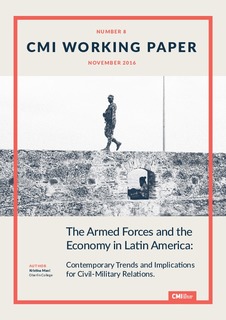| dc.contributor.author | Mani, Kristina | |
| dc.date.accessioned | 2018-01-04T08:21:20Z | |
| dc.date.available | 2018-01-04T08:21:20Z | |
| dc.date.issued | 2016-11-01 | |
| dc.identifier | oai:www.cmi.no:6020 | |
| dc.identifier.citation | Bergen: Chr. Michelsen Institute (CMI Working Paper WP 2016:08) 28 p. | |
| dc.identifier.isbn | 978-82-8062-614-1 | |
| dc.identifier.issn | 0804-3639 | |
| dc.identifier.uri | http://hdl.handle.net/11250/2475198 | |
| dc.description.abstract | This paper examines several cases of military economic activities that persist in Latin America, despite the political and economic liberalization processes that have been under way in the region for several decades. Taking off from the concept of military entrepreneurship, the paper examines three contemporary forms of military entrepreneurship, surveying cases of how Honduran and Nicaraguan militaries came to manage assets through pension funds, how Venezuelan and Bolivian militaries have been incorporated into state-led efforts to foster social cohesion and resource redistribution, and how Colombia’s military has gained distinction in a growing defense industrial sector and in the training of foreign military and security forces. The paper concludes with comments on the implications of these forms of economic activity for the military and for democratic politics. | |
| dc.language.iso | eng | |
| dc.publisher | Chr. Michelsen Institute | |
| dc.relation | CMI Working Paper | |
| dc.relation | WP 2016:08 | |
| dc.relation.ispartof | CMI Working Paper | |
| dc.relation.ispartofseries | CMI Working Paper WP 2016:08 | |
| dc.relation.uri | https://www.cmi.no/publications/6020-the-armed-forces-and-the-economy-in-latin-america | |
| dc.subject | Honduras | |
| dc.subject | Latin America | |
| dc.subject | Nicaragua | |
| dc.subject | Venezuela | |
| dc.subject | Bolivia | |
| dc.subject | Colombia | |
| dc.title | The Armed Forces and the Economy in Latin America: Contemporary Trends and Implications for Civil-Military Relations. | |
| dc.type | Working paper | |
